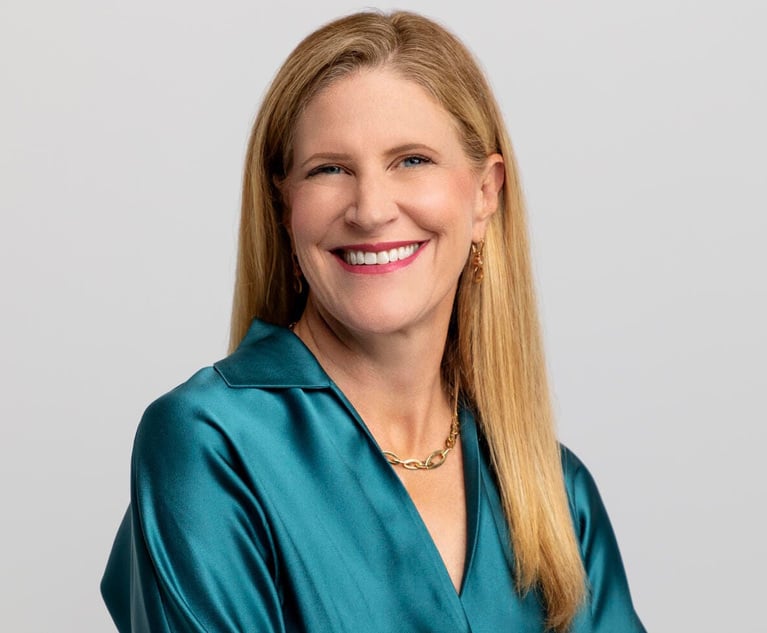BlackRock, Vanguard Defend How They Handle Corporate Climate Risk After Critical Report
The report accused New York-based BlackRock and Pennsylvania-based Vanguard of "using their shareholder voting power to shield corporate boards from accountability ... for their failures on climate and their irresponsible lobbying."
September 18, 2019 at 05:09 PM
4 minute read
 Photo: Shutterstock.com
Photo: Shutterstock.com
Two major investment firms, BlackRock Inc. and The Vanguard Group Inc., strongly defended themselves Wednesday against a report that accused them of "greenwashing" their responses to climate risk.
Majority Action, a California-based corporate governance nonprofit, issued the report Tuesday titled "Climate in the Boardroom: How Asset Manager Voting Shaped Corporate Climate Action in 2019."
The report accused New York-based BlackRock and Pennsylvania-based Vanguard of "using their shareholder voting power to shield corporate boards from accountability … for their failures on climate and their irresponsible lobbying."
It said BlackRock and Vanguard voted overwhelmingly against the climate-critical shareholder resolutions, with BlackRock supporting just five of 41, and Vanguard only four. "At least 16 of these critical climate votes would have received majority support of voting shareholders if these two largest asset managers had voted in favor of them," the report said.
In contrast, the report praised the votes of Legal & General Investment Management, BNP Paribas Asset Management, PIMCO and Standard Life Aberdeen on climate-related proposals.
Majority Action recommended that asset owners examine the proxy voting activities of asset managers, hold the asset managers they hire to account for inadequate voting policies, and consider those activities when evaluating and selecting asset managers.
Both Vanguard and BlackRock have said in the past they were working closely with companies to disclose and manage their climate-related risk.
Neither BlackRock chief legal officer Christopher Meade nor Vanguard general counsel Anne Robinson responded to a request for comment Wednesday.
But BlackRock's Farrell Denby, vice president in corporate communications, told Corporate Counsel, "Blindly supporting proposals is not a responsible approach to stewardship. … It would be wrong to equate good governance with voting against management without regard for a proposal's impact."
Denby said his company engaged 207 companies globally on the topic of climate risk this past year. He noted that's "a number that far exceeds the 36 climate-related shareholder proposals that came to a vote in the U.S. As the numbers demonstrate, we put a priority on understanding how a company is addressing climate-related issues even in the absence of shareholder proposals."
Vanguard made a similar argument. Spokeswoman Carolyn Wegemann said, "While voting at shareholder meetings is important, it is only one part of the larger corporate governance process. We regularly engage with companies on our shareholders' behalf and believe that engagement and broader advocacy, in addition to voting, can effect meaningful changes that generate long-term value for shareholders."
Wegemann said this proxy year Vanguard engaged with some 250 companies in carbon-intensive industries to discuss their governance and disclosure of climate risk. She also cited the firm's advocacy efforts with organizations and initiatives such as the Sustainability Accounting Standards Board, Task Force on Climate-related Financial Disclosures, and United Nations Principles for Responsible Investment.
Majority Action, however, said BlackRock's and Vanguard's company engagement efforts fall short and "lack demonstrable results in changing company behavior."
Among the 16 proposals that would have passed with the two firms' support were two requiring ExxonMobil and Duke Energy to report on their lobbying activities, and several that would have required energy companies, including ExxonMobil, to name an independent board chair.
At ExxonMobil, proponents argued that the company has responded to climate change inadequately "in part driven by lack of independent board oversight."
Citing the report, other climate advocacy groups also criticized the two companies.
For example, attorney Danielle Fugere, president of As You Sow, issued a statement accusing BlackRock and Vanguard of being inconsistent with their own stated purpose, while also jeopardizing shareholder value.
"There is little time left to change the trajectory of a warming globe, yet these firms are abdicating the power of their proxy vote to help protect the climate, the economy, and investor portfolios from systemic climate risks," Fugere said.
This content has been archived. It is available through our partners, LexisNexis® and Bloomberg Law.
To view this content, please continue to their sites.
Not a Lexis Subscriber?
Subscribe Now
Not a Bloomberg Law Subscriber?
Subscribe Now
NOT FOR REPRINT
© 2025 ALM Global, LLC, All Rights Reserved. Request academic re-use from www.copyright.com. All other uses, submit a request to [email protected]. For more information visit Asset & Logo Licensing.
You Might Like
View All
John Deere Annual Meeting Offers Peek Into DEI Strife That Looms for Companies Nationwide
7 minute read
Wells Fargo and Bank of America Agree to Pay Combined $60 Million to Settle SEC Probe

Former Capital One Deputy GC Takes Legal Reins of AIG Spinoff

Ex-Six Flags CLO Lands New C-Suite Post—This Time as HR Chief
Trending Stories
- 1LSU General Counsel Quits Amid Fracas Over First Amendment Rights of Law Professor
- 2An Eye on ‘De-Risking’: Chewing on Hot Topics in Litigation Funding With Jeffery Lula of GLS Capital
- 3Arguing Class Actions: With Friends Like These...
- 4How Some Elite Law Firms Are Growing Equity Partner Ranks Faster Than Others
- 5Fried Frank Partner Leaves for Paul Hastings to Start Tech Transactions Practice
Who Got The Work
J. Brugh Lower of Gibbons has entered an appearance for industrial equipment supplier Devco Corporation in a pending trademark infringement lawsuit. The suit, accusing the defendant of selling knock-off Graco products, was filed Dec. 18 in New Jersey District Court by Rivkin Radler on behalf of Graco Inc. and Graco Minnesota. The case, assigned to U.S. District Judge Zahid N. Quraishi, is 3:24-cv-11294, Graco Inc. et al v. Devco Corporation.
Who Got The Work
Rebecca Maller-Stein and Kent A. Yalowitz of Arnold & Porter Kaye Scholer have entered their appearances for Hanaco Venture Capital and its executives, Lior Prosor and David Frankel, in a pending securities lawsuit. The action, filed on Dec. 24 in New York Southern District Court by Zell, Aron & Co. on behalf of Goldeneye Advisors, accuses the defendants of negligently and fraudulently managing the plaintiff's $1 million investment. The case, assigned to U.S. District Judge Vernon S. Broderick, is 1:24-cv-09918, Goldeneye Advisors, LLC v. Hanaco Venture Capital, Ltd. et al.
Who Got The Work
Attorneys from A&O Shearman has stepped in as defense counsel for Toronto-Dominion Bank and other defendants in a pending securities class action. The suit, filed Dec. 11 in New York Southern District Court by Bleichmar Fonti & Auld, accuses the defendants of concealing the bank's 'pervasive' deficiencies in regards to its compliance with the Bank Secrecy Act and the quality of its anti-money laundering controls. The case, assigned to U.S. District Judge Arun Subramanian, is 1:24-cv-09445, Gonzalez v. The Toronto-Dominion Bank et al.
Who Got The Work
Crown Castle International, a Pennsylvania company providing shared communications infrastructure, has turned to Luke D. Wolf of Gordon Rees Scully Mansukhani to fend off a pending breach-of-contract lawsuit. The court action, filed Nov. 25 in Michigan Eastern District Court by Hooper Hathaway PC on behalf of The Town Residences LLC, accuses Crown Castle of failing to transfer approximately $30,000 in utility payments from T-Mobile in breach of a roof-top lease and assignment agreement. The case, assigned to U.S. District Judge Susan K. Declercq, is 2:24-cv-13131, The Town Residences LLC v. T-Mobile US, Inc. et al.
Who Got The Work
Wilfred P. Coronato and Daniel M. Schwartz of McCarter & English have stepped in as defense counsel to Electrolux Home Products Inc. in a pending product liability lawsuit. The court action, filed Nov. 26 in New York Eastern District Court by Poulos Lopiccolo PC and Nagel Rice LLP on behalf of David Stern, alleges that the defendant's refrigerators’ drawers and shelving repeatedly break and fall apart within months after purchase. The case, assigned to U.S. District Judge Joan M. Azrack, is 2:24-cv-08204, Stern v. Electrolux Home Products, Inc.
Featured Firms
Law Offices of Gary Martin Hays & Associates, P.C.
(470) 294-1674
Law Offices of Mark E. Salomone
(857) 444-6468
Smith & Hassler
(713) 739-1250






